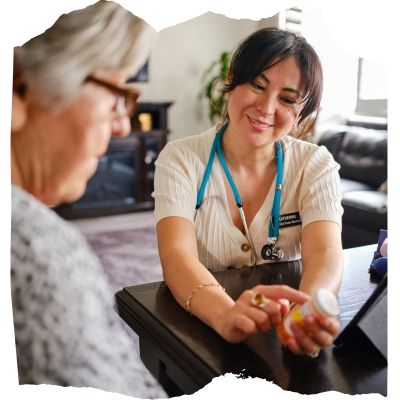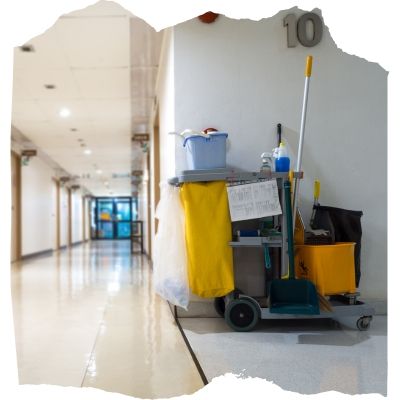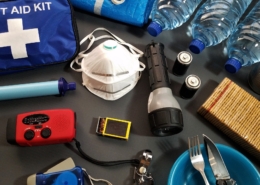The Many Hats of Rural Locum Tenens Providers
When people imagine a medical provider, they often picture a sterile clinician focused solely on diagnosing and treating illness. In large hospitals or urban settings, providers usually stay within narrow lanes, supported by specialists, technicians, and an extensive care team. But in rural communities, the picture looks very different. Here, a locum tenens provider doesn’t just wear one hat — they wear many, often switching roles within the same shift. It’s demanding, it’s unpredictable, and yet for many, it’s some of the most fulfilling work they’ll ever do. Walk with us as we explain some of these different “hats!”
Medical Provider
At the heart of it all, rural locum tenens serve as medical providers in the truest sense. They evaluate patients, create treatment plans, and make tough judgment calls about whether someone can be stabilized locally or needs to be transferred to a higher level of care. In critical access hospitals, that decision can mean arranging a medevac flight or driving hours down a rural highway. Providers often describe the weight of these choices as both sobering and empowering — knowing that their judgment directly shapes outcomes for people who don’t have another option nearby.
Therapist
Yet medicine in rural areas doesn’t stop with the clinical. Locum tenens frequently find themselves listening deeply, helping patients unpack the fears and stresses behind their conditions. In fact, simply having the time to sit and fully listen with patients is a perk of the (rural) job.
Providers like Mary Ellen Doty, NP and WMS Founder, find that “it is such a pleasure to have the time to take with each patient — which is most often the case in rural hospitals.” A farmer may put off treatment because the cattle still need feeding, or a grandmother may hide symptoms to keep caring for her grandkids. Providers become part-counselor, offering empathy and perspective in conversations that might last longer than the actual exam. These moments of connection are often what patients remember most, even after the bandages come off.
Social Worker
In towns where social services are stretched thin, providers often act as unofficial social workers. They help families navigate difficult realities, such as finding long-term care for a loved one with dementia, or connecting a struggling parent with resources to keep their household afloat. It’s rarely simple, and it often takes creativity, persistence, and timely advocacy to find solutions. It often also requires a network of providers at other, larger facilities to help coordinate care. Still, providers understand that without addressing these underlying challenges, medical care alone won’t be enough. Their role stretches beyond the exam room into the very fabric of rural life.

Patient Advocate
Similar to the Social Worker “hat,” advocacy extends into the broader healthcare system. Referrals to specialists can feel impossible for patients who don’t have transportation, money, or even the confidence to call a large hospital in the city. Locum tenens step in as navigators, ensuring that appointments are made, information is clear, and follow-up is possible. For many patients, having a provider take that extra step is the difference between receiving ongoing care and falling through the cracks. In places where the system feels overwhelming, providers become the steady hand guiding patients through it.
Nurse
In rural facilities, everyone pitches in. When there is no nurse to get an IV started or when the situation calls for urgent action, providers don’t hesitate to roll up their sleeves. They step into nursing roles — starting lines, inserting tubes, or simply monitoring a patient closely through a long night. These tasks and others, though sometimes considered “not my job” in larger hospitals, are part of the daily rhythm of rural practice. Far from feeling burdensome, many providers say it reminds them why they entered medicine in the first place: hands-on, direct care for the person right in front of them.
Lab Tech and Radiology Assistant
Some clinics are fortunate to have lab staff, but many rural posts don’t. In those cases, providers may find themselves running basic lab tests or stepping in to support imaging (if the facility HAS the equipment) when no one else is available. It’s not glamorous work, but it’s essential to getting patients answers quickly. The willingness to take on these responsibilities underscores the adaptability required in rural practice. Providers know that when resources are scarce, every skill counts, even those learned years ago and rarely used in larger facilities.
Teacher
That spirit of adaptability often spills over into teaching. Locum tenens with decades of experience may pass on hard-earned ER tricks to nurses, local EMTs, or new/shadowing APPs eager to sharpen their skills. A night shift can turn into an impromptu training session on advanced airway management or wound closure. Teaching becomes part of the job, not just to build confidence in the immediate team but to strengthen the community’s ability to care for itself long after the locum moves on.
Student
At the same time, rural medicine demands humility. Providers constantly refresh their knowledge through continuing education: certification courses, self-directed study, and perhaps most importantly, hands-on experiences. In facilities without specialists nearby, being up-to-date isn’t optional — it’s vital. Many locum tenens find themselves studying in the quiet hours between shifts, while traveling to/from a destination, reviewing the latest guidelines or reaching out to colleagues for advice. The dual role of teacher and student keeps providers sharp, adaptable, and open to learning from both peers and patients.
Janitor
Few people picture a medical provider mopping up bodily fluids or cleaning a room at 2 a.m., but in rural assignments, that’s sometimes part of reality. When there’s no night janitor and the ER needs to be turned over quickly, providers pitch in. It’s not glamorous, but it speaks volumes about the humility required to serve in small communities. These moments of unfiltered teamwork often deepen the bond between providers and staff, as everyone knows that no one is too important to do what needs to be done. It takes a special breed of healthcare professional to thrive in this work – not everyone can.
Community Member
Beyond clinical duties, locum tenens often become woven into the community itself. Patients may recognize them at the grocery store or wave as they drive past on a country road. Accepting an invitation to a community dinner, listening to stories of hunting trips, or respecting local traditions builds trust that carries back into the clinic. Providers aren’t just outsiders dropping in; they’re welcomed guests who become part of the community’s story, however briefly. That connection can be just as healing as any prescription.
Problem-Solver
Rural assignments also require constant problem-solving. When equipment breaks, supplies run short, or weather disrupts medevac flights, providers must think creatively. Improvising with what’s available becomes second nature — whether that means using alternate medications, repurposing supplies, (like using an insulated lunch box as a NICU – true story) or simply relying on strong clinical judgment in the absence of ideal tools. These challenges can be stressful, but they also forge resilience and resourcefulness that providers carry with them long after the assignment ends.
Lifeline
Ultimately, rural providers serve as a lifeline. For many patients, they are the only point of medical care within hundreds of miles. Their presence brings reassurance that if an emergency strikes, someone is there to help. That sense of security is profound in communities that would otherwise face daunting isolation. For providers, being that lifeline is both a responsibility and a privilege — a reminder of why they chose this work despite its challenges.
Conclusion
The many hats of rural locum tenens illustrate a truth often hidden in modern medicine: that care is not just about diagnoses and treatments, but about stepping into whatever role is needed in the moment. It requires humility, adaptability, and a willingness to serve in ways that go beyond the stethoscope. For the providers who embrace it, this work offers unmatched variety, impact, and meaning. And for the communities they serve, it means having someone they can trust to do whatever it takes. At Wilderness Medical Staffing, we are proud to support these providers and keep our mission alive: ensuring that even the most remote communities have access to the care they deserve, and to make medicine meaningful again.
Are you ready to don many hats and make a real difference? Talk to one of our recruiters today!



















